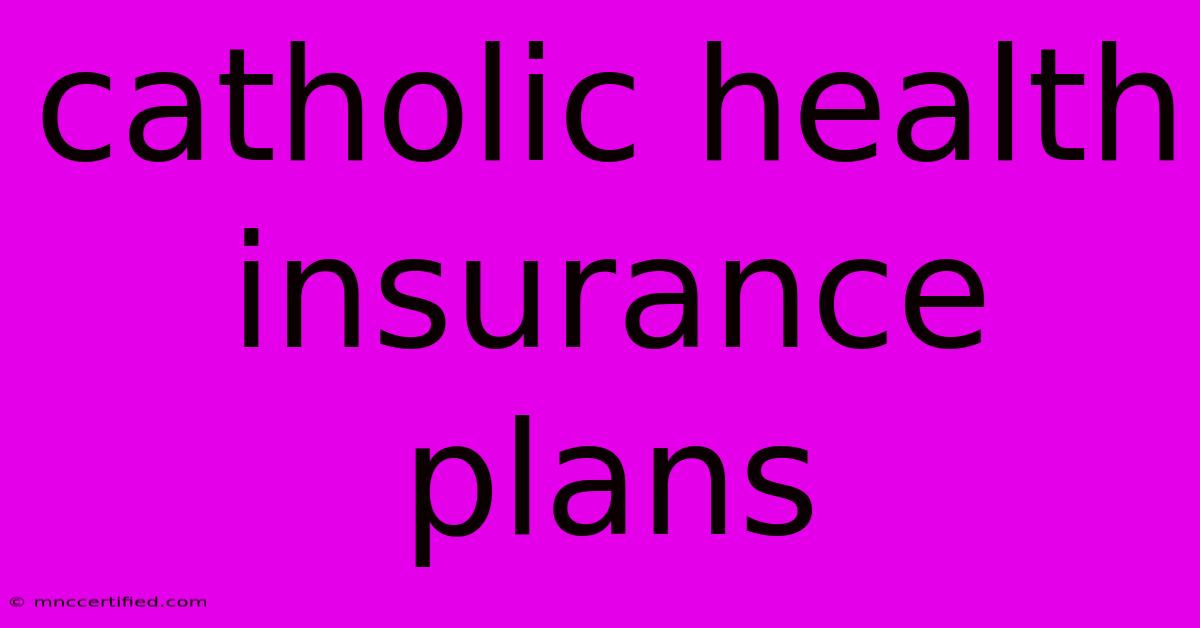Catholic Health Insurance Plans

Table of Contents
Catholic Health Insurance Plans: A Comprehensive Guide
Finding the right health insurance can be a daunting task, and for Catholics seeking coverage aligned with their values, the process can feel even more complex. This guide explores Catholic health insurance plans, outlining their key features, benefits, and considerations to help you make an informed decision.
Understanding Catholic Health Insurance
Catholic health insurance, often associated with Catholic hospitals and healthcare systems, generally adheres to the Ethical and Religious Directives for Catholic Health Care Services (ERDs). These directives, issued by the United States Conference of Catholic Bishops (USCCB), guide Catholic healthcare institutions in providing ethical and morally sound care. This means certain procedures, like abortion, sterilization, and in-vitro fertilization (IVF), are typically excluded from coverage.
Key Features of Catholic Health Insurance Plans:
- Adherence to ERDs: This is the cornerstone of Catholic health insurance. Expect coverage to align with the principles outlined in the ERDs.
- Emphasis on holistic care: Catholic healthcare providers often emphasize a holistic approach to health, encompassing physical, mental, and spiritual well-being.
- Network limitations: The provider network might be smaller than some secular plans, as it's often limited to hospitals and doctors that share the same ethical principles.
- Potential cost savings: Some Catholic health systems offer integrated care models, potentially leading to cost savings. However, this is not always guaranteed and will depend on the specifics of your plan.
What Services are Typically Excluded from Catholic Health Insurance Plans?
It's crucial to understand what services are generally not covered under Catholic health insurance plans due to their adherence to the ERDs. These include but are not limited to:
- Abortion: This is almost universally excluded.
- Sterilization: Procedures like tubal ligation or vasectomies are typically not covered.
- In-vitro Fertilization (IVF): This assisted reproductive technology is usually excluded.
- Certain Contraceptives: While some plans might cover certain types of contraception, many will not.
Finding a Catholic Health Insurance Plan: A Step-by-Step Guide
- Identify your needs: Before you start searching, assess your healthcare needs. Consider your age, health conditions, and family planning goals.
- Research Catholic health systems: Familiarize yourself with Catholic healthcare systems in your area. Their websites often provide information about their affiliated insurance plans.
- Compare plans: Use online comparison tools or consult with an insurance broker to compare plans. Pay close attention to the benefits, coverage, provider networks, and premiums.
- Check the ERDs: Verify that the insurance plan adheres to the Ethical and Religious Directives. You can usually find this information on the insurer's website or by contacting them directly.
- Review the fine print: Carefully read the plan documents, including the summary of benefits and coverage (SBC), to understand exactly what's covered and excluded.
- Consult with your doctor: Discuss your insurance options with your doctor to ensure the plan meets your healthcare needs.
Alternatives to Traditional Catholic Health Insurance
If you find the limitations of traditional Catholic health insurance restrictive, you might consider these alternatives:
- Faith-based organizations: Some faith-based organizations offer support and resources for accessing healthcare that aligns with religious values.
- Health sharing ministries: These ministries are not insurance plans but operate on a community-based sharing system. Eligibility and coverage may vary significantly.
- Supplemental insurance: Consider adding supplemental insurance to cover services excluded from your Catholic plan, such as specific reproductive healthcare. Always carefully review the terms and conditions of any supplemental plan.
Conclusion: Making an Informed Choice
Choosing a Catholic health insurance plan requires careful consideration of your values, healthcare needs, and financial situation. By understanding the principles guiding Catholic healthcare and diligently researching available options, you can find a plan that provides comprehensive coverage while aligning with your beliefs. Remember to always consult with your doctor and a qualified insurance professional to make the best decision for you and your family. This guide provides general information; always verify details with the specific insurer.

Thank you for visiting our website wich cover about Catholic Health Insurance Plans. We hope the information provided has been useful to you. Feel free to contact us if you have any questions or need further assistance. See you next time and dont miss to bookmark.
Featured Posts
-
Man City Vs Tottenham 0 4 Final Score
Nov 24, 2024
-
Arsenal 3 0 Nottingham Forest Stats
Nov 24, 2024
-
Hearts Celtic Match Which Tv Channel
Nov 24, 2024
-
Game Day No 9 Ole Miss Florida
Nov 24, 2024
-
Goalless Draw Everton Vs Brentford Report
Nov 24, 2024